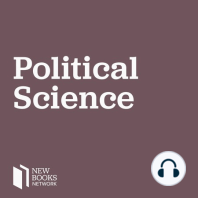62 min listen

A. Azfar Moin and Alan Strathern, "Sacred Kingship in World History: Between Immanence and Transcendence" (Columbia UP, 2022)
A. Azfar Moin and Alan Strathern, "Sacred Kingship in World History: Between Immanence and Transcendence" (Columbia UP, 2022)
ratings:
Length:
47 minutes
Released:
Apr 25, 2023
Format:
Podcast episode
Description
Sacred kingship has been the core political form, in small-scale societies and in vast empires, for much of world history. Sacred Kingship in World History: Between Immanence and Transcendence (Columbia UP, 2022) recasts the relationship between religion and politics by exploring this institution in long-term and global comparative perspective. Editors A. Azfar Moin and Alan Strathern present a theoretical framework for understanding sacred kingship, which leading scholars reflect on and respond to in a series of essays. They distinguish between two separate but complementary religious tendencies, immanentism and transcendentalism, which mold kings into divinized or righteous rulers, respectively. Whereas immanence demands priestly and cosmic rites from kings to sustain the flourishing of life, transcendence turns the focus to salvation and subordinates rulers to higher ethical objectives. Secular modernity does not end the struggle between immanence and transcendence—flourishing and righteousness—but only displaces it from kings onto nations and individuals. After an essay by Marshall Sahlins that ranges from the Pacific to the Arctic, the book contains chapters on religion and kingship in settings as far-flung as ancient Egypt, classical Greece, medieval Islam, Mughal India, modern European drama, and ISIS. Sacred Kingship in World History sheds new light on how religion has constructed rulership, with implications spanning global history, religious studies, political theory, and anthropology.
Alan Strathern teaches European and Global History as an Associate Professor in the Faculty of History at Oxford and as a Fellow at Brasenose College; he also lectures at St. John's College. He works on the global history of religious encounter and conversion, particularly in the early modern period (1500-1800), while additionally writing on the nature of religious change and its relationship with politics across world history.
A. Azfar Moin is an Associate Professor in the Department of Religious Studies at the University of Texas at Austin. He studies the early modern Islamic world from comparative perspectives with a focus on concepts and practices of sovereignty.
Justin N. Smolin is a PhD candidate in the History of Religions specializing in at the Divinity School in the University of Chicago. His research focuses on the question of the translatability of religious difference, with a particular view to the early modern Islamicate world: his broader interests include literary history, translation, and political theology.
Learn more about your ad choices. Visit megaphone.fm/adchoices
Support our show by becoming a premium member! https://newbooksnetwork.supportingcast.fm/political-science
Alan Strathern teaches European and Global History as an Associate Professor in the Faculty of History at Oxford and as a Fellow at Brasenose College; he also lectures at St. John's College. He works on the global history of religious encounter and conversion, particularly in the early modern period (1500-1800), while additionally writing on the nature of religious change and its relationship with politics across world history.
A. Azfar Moin is an Associate Professor in the Department of Religious Studies at the University of Texas at Austin. He studies the early modern Islamic world from comparative perspectives with a focus on concepts and practices of sovereignty.
Justin N. Smolin is a PhD candidate in the History of Religions specializing in at the Divinity School in the University of Chicago. His research focuses on the question of the translatability of religious difference, with a particular view to the early modern Islamicate world: his broader interests include literary history, translation, and political theology.
Learn more about your ad choices. Visit megaphone.fm/adchoices
Support our show by becoming a premium member! https://newbooksnetwork.supportingcast.fm/political-science
Released:
Apr 25, 2023
Format:
Podcast episode
Titles in the series (100)
Sam Lebovic, "A Righteous Smokescreen: Postwar America and the Politics of Cultural Globalization" (U Chicago Press, 2022): An interview with Sam Lebovic by New Books in Political Science